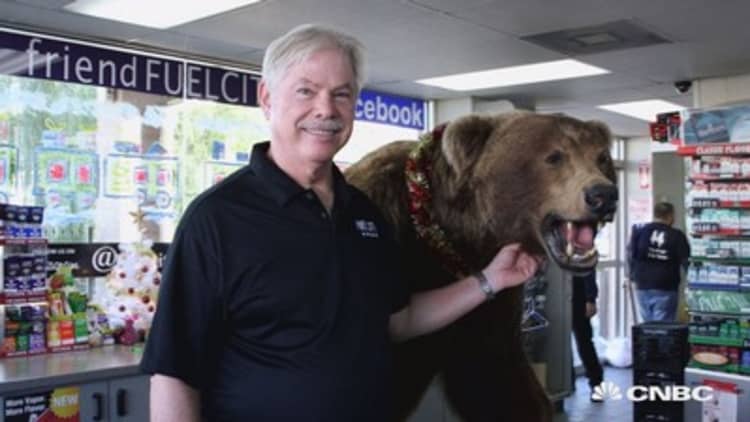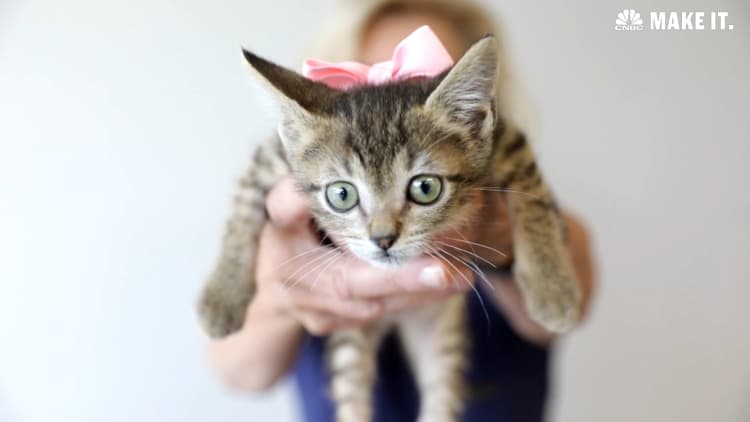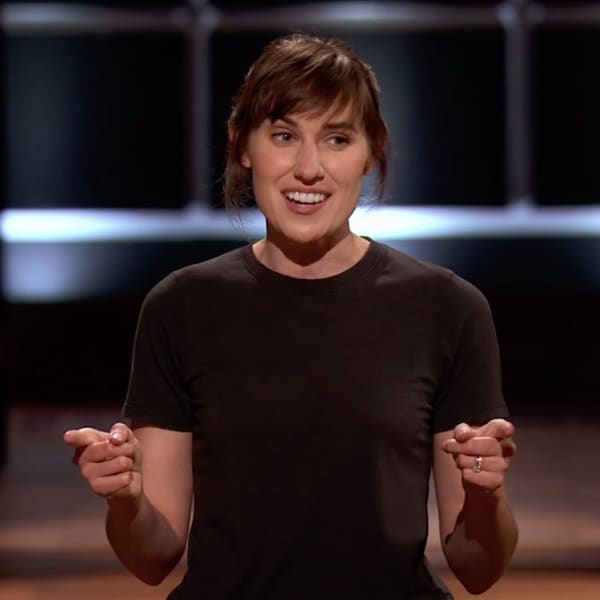We dress our pets in designer clothes. We feed them gourmet human food. We treat them like family. So why not invite them to happy hour?
Brandon Zavala sells wine for cats and beer for dogs, even though his products don’t actually contain alcohol. They just make pets act a little buzzed.
“Some people yell at me and say, ‘You’re an idiot! Why are you trying to make animals human?’” says the 33-year-old entrepreneur. “I’m sorry, I’m not the one making animals human. You are.”
Three years ago Zavala started his business Apollo Peak, named after his eldest cat, Apollo, in Golden, Colorado. Zavala was working at a pet food company when he noticed something missing as he patrolled store aisles.
“There was nothing out there that existed other than just hard treats and hard food and wet food,” he says.
Zavala wondered why no one had thought of creating something liquid — a pet beverage — especially since the beverage market for humans had been growing “exponentially,” he says.
“What I noticed, too, is that wine culture in America is actually quite big,” he says. “A large percentage of cat owners love wine.”
Zavala decided to make a cat “wine.” While there’s no actual alcohol in the beverage, there is liquid catnip, which creates a similar effect.
“If you can make cats look like they’re drinking something, and roll over as if they’re acting drunk, people are going to love it,” he laughs.
He even came up with names for the wine like Pinot Meow and Catbernet. The idea, he says, “was just a funny little spur-of-the-moment thing that I thought, ‘Maybe it’ll work, maybe it won’t. I don’t know, we’ll give it a shot.’”
Zavala put $4,000 on a credit card to get his new side hustle started in 2015. He experimented with the right ingredients until he found a winning formula of water, natural food coloring and catnip extracts (don’t ask him about the long and unsuccessful attempt to use beets for coloring).
By that October, he finally came up with a product he felt cats would like, so he started taking his new feline wine to local pet stores. He immediately landed his first sales. “I was doing it all out of my kitchen.”
Going viral
In 2016, Zavala decided to make a bigger push, contacting bigger pet retailers. Meowbox, which sends boxes of cat goodies to subscribers every month, wanted 4,000 units.
“It didn’t set in for maybe a day or two after that weekend that I said, ‘Ok, I have to figure out how to make 4,000 bottles.’”
Soon his apartment was full of bottles of Pinot Meow. Then he rented a small storage space. Then Apollo Peak was written up in the Huffington Post, and eventually producers from ABC's “Shark Tank” were calling.
“I had never known what going viral meant,” Zavala says. “But all of a sudden, our store was just nonstop.”
Next he developed wine for dogs (and eventually beer too). Instead of catnip, Zavala realized that dogs are attracted to anything that has a meat flavor, so he created a beverage with a chicken broth base and ingredients like anise seed powder, which apparently mellows out dogs. Zavala has added health benefits (ingredient glucosamine reduces inflammation, for example) to make the product more marketable.
“The biggest thing for dog owners is they want functional benefits basically for their products, and that’s what we’re doing.”
Growing pains
Eventually Brandon Zavala realized he had to quit his day job at the pet food company. He told his boss, “I love this place, but I don’t know if you heard anything, but I made this wine for cats,” Zavala says. His boss told him, “Oh, I totally heard about it.” Zavala says he left on good terms with the company.
In the meantime, things weren’t going so well inside his small, young management team at Apollo Peak. Zavala had brought in a couple of friends as partners who contributed sweat equity in exchange for a piece of the company. Some worked, some did not.
“I kind of slowly said, ‘This is probably a bad idea,’ because they’re not working, they just want a piece of the pie.”
He made the difficult decision to let some people go.
“It’s extremely hard. You lose a friendship,” Zavala says. “It seems fun that you’re working with your friends, but over time, money can always create these barriers between you and you friends, no matter what, and it’s just not the best thing to do.”
In the Shark Tank
Total revenues for 2016 were $450,000. Zavala says that number rose to $560,000 last year. Some of that jump was due to “Shark Tank,” where Zavala pitched his company and won an investment...only to lose it.
More on that shortly.
When a producer first approached Zavala to bring Apollo Peak cat wines on the show, Zavala ignored him.
“At the time there was so much noise going on, and I had so much to do, I had thousands of bottles to make,” he says, realizing in hindsight that it was crazy to ignore a show which launched so many successful products. But he could barely keep up with current orders.
“We were getting yelled at left and right, and I was just like, ‘I have to focus on these customers or this is never going to happen.’”
However, the producer was persistent, and Zavala eventually went on the show in September of 2016.
“When I got there, I think that’s when it finally set in to me that it was a real thing.” Zavala had not worked on a pitch, and as he watched all the other entrepreneurs preparing to meet the Sharks, he started drinking a lot of coffee. “I felt like I was going crazy.”
When he finally went on stage to meet the Sharks, he didn’t get very far. “All of a sudden I just hear from the back of me, ‘Cut!’” Zavala says he had no idea what was going on. “They said, ‘The cats are loose! The cats are loose!’”
The production team had apparently brought in some shelter cats for the scene, but the cats were not playing along (they’re cats, I mean, come on).
“They just went nuts and ran everywhere.”

Once the situation was under control, Zavala began pitching the Sharks, and he succeeded in starting a bidding war. Kevin O’Leary and Daymond John both wanted to invest $100,000 for 20 percent of his company.
“I had done the math before and said 20 percent would be the highest that I would do,” Zavala says.
O’Leary has experience selling wine, while John knows the pet business. Zavala chose the former, even though Apollo Peak products do not actually contain alcohol.
“I was trying to brand our company more as a wine company, or a pet wine company, versus just some pet company.”
After the shoot was over, Zavala returned to his trailer, where a staff psychiatrist walked in to check on him (the inventors of the Squatty Potty tell a similar story). The doctor wanted to make sure he was ok.
“I remember my response as if it was yesterday,” Zavala says. “I was like, ‘Yeah, everything’s fine. I just feel like I’m having a heart attack!’” He was experiencing chest pains, though it was determined he was suffering from anxiety, not a coronary.
After "Shark Tank..."
“I didn’t get that $100,000,” Zavala reveals.
After he taped the show, O’Leary’s team came to look over Apollo Peak’s books and determined that the company was too new, too risky. He only had records going back four months. Zavala says the team told him that to invest in the company, O’Leary would need to own more of it. Zavala refused to budge.
Eventually the investment went away, though Zavala says O’Leary’s people told him, “If you’re interested later on, if your business continues to grow, we’ll be interested as well.” O'Leary confirms Zavala's account of what happened to CNBC Make It.
Brandon Zavala moved on, figuring his segment would never air on “Shark Tank” since the deal went away.
He was wrong.
Zavala appeared on Shark Tank in April 2017, seven months after the taping. By this time, Apollo Peak had moved out of its tiny bottling space to a 2,700-square-foot full-production facility.
He had received an email from producers in March notifying him that his segment would air in three weeks, and he initially decided to ramp up production ahead of the show.
Then he had a dream.
“It was a dream of me sitting at a warehouse with a bunch of stuff, and it was going nowhere,” Zavala says. After he woke up, he told employees they were not going to increase production ahead of the “Shark Tank” appearance. His executive decision angered one of his original partners, but he turned out to be right. After the segment aired, Zavala claims orders jumped, but only by about $30,000.
“Not a ton,” he says. “I don’t think that there’s a lot of pet folks that watch ‘Shark Tank.’”
Canine cannabis?
Up next, Zavala is trying to figure out how to make a cannabis infused beverage for pets. This is Colorado, after all.
“I have used CBD [cannabinoid] in some test products that we’ve done before.” He says it helps with pet inflammation and anxiety. However, he wants to make sure he doesn’t get himself in any legal trouble.
Brandon Zavala has become very careful about paying attention to regulations.
For example, he discovered that pet food products are often regulated state by state, and manufacturers sometimes have to pay a fee for every product line.
“We have about 20 products that we make,” he says. Totaling all the fees from various states can be whopping $100,000...a year. “Twenty percent of our sales revenues is just going to registering our products to the states.”
In response, Zavala has started changing the description of his beverages from pet food to things like “liquid catnip,” which is not regulated the same way.
At least not yet.
Why name your company after a cat that hates your product?
Perhaps the strangest thing of all in this cat wine/dog beer company is that it’s named after a cat who doesn’t even like the product.
Zavala’s younger cat, Hades, loves the cat wine, but Apollo has never been a fan. So why name it Apollo Peak instead of Hades Peak?
“Apollo disappeared for two years of my life. I thought he was dead,” Brandon Zavala says. The cat was eventually discovered not far from his home.
“I don’t know what happened,” he says, “and for me it’s like, ‘He survived?’ I want this business to survive. So why not name it after a cat who’s been out in the wild — and who knows what he’s been through — returned and is living a nice life now?”
Why not, indeed?
More from Strange Success:
Fake dog testicles made this man a millionaire
Meet a professional mermaid who charges up to $6,000 per appearance
More from Strange Success: How one man went from homeless to cancer patient to a millionaire art dealer
Like this story? Check out the Strange Success podcast.







